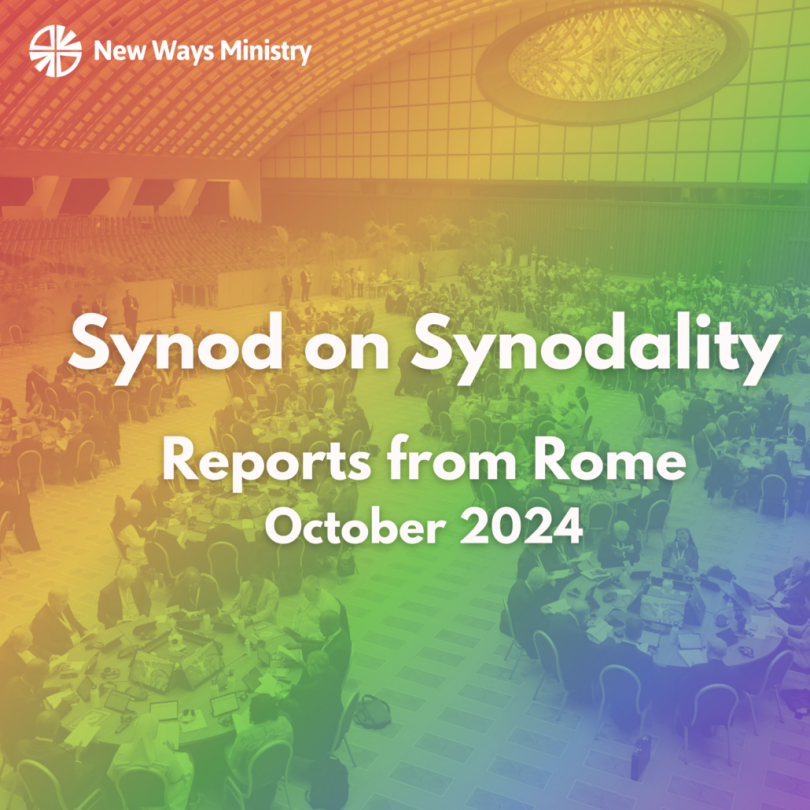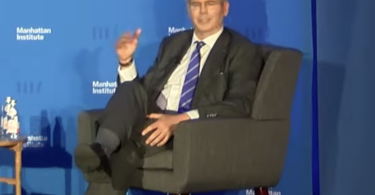The Synod on Synodality’s General Assembly published its Final Document last night, concluding not only this month’s gathering but the larger three-year process initiated by Pope Francis in 2021. The pope has clarified that he will not be issuing an apostolic exhortation, as had been customary for previous synods, so this Final Document is indeed the final word for now.
The following is a statement from Francis DeBernardo, New Ways Ministry’s Executive Director, on the document and this Synod’s conclusion. Bondings 2.0 will provide further coverage throughout this week.
ROME—For a second time, the Synod’s General Assembly failed to include LGBTQ+ issues in its Final Document, despite the Catholic faithful persistently naming it a top priority. Such an omission will certainly disappoint many pro-LGBTQ+ Catholics who hoped for positive change through this synodal process. But while the Final Document falls short, the synodal process has prepared fertile ground for change. New Ways Ministry urges Catholics not to despair, but to continue their work for justice and equality.
The laity of the church must now become louder and more vigorous than ever in advocating for reform. The synodal process’ best outcome is its reaffirmation of Vatican II’s strong call that the entire people of God be co-responsible for the Church and involved at every level in decision making. Catholic LGBTQ+ advocates must not let dashed hopes about greater reform through the Synod impede them from becoming more involved in ecclesial governance.
Regardless of this Final Document, the work remains to build Catholicism into “a home for all,” as Pope Francis has envisioned.
Authoritarian popes from 1978 to 2013 stifled any real discussion of LGBTQ+ issues in the Church, even at the highest levels. Now, it will take time for Catholicism to grow into a synodal mode. This challenge is made more difficult because many bishops, particularly in the U.S., were appointed by the two previous popes and share their autocratic tendencies even now. Canon law must be sufficiently revised to make lay involvement and wide consultation mandatory or such intransigent bishops and Church leaders will not change.
When asked at Synod press conferences this month about the possibility of such stonewalling, speaker after speaker encouraged lay people to take synodal initiatives even if none are forthcoming from the leaders of their dioceses or parishes. These past three years have shown that synodality is the path forward for the Church, and it will not be denied.
The Synod on Synodality as a whole remains a landmark moment in Church history for LGBTQ+ Catholics. For the first time at a global level, the concerns and desires of queer people and allies were not only voiced, but intently listened to by Vatican leaders. The synodal process made clear that LGBTQ+ inclusion is a key concern for the faithful. During more than two years of consultations on every continent and at every level, Catholics let their leaders know that the time has come for discrimination and exclusion to end.
Never again can it be said that LGBTQ+ inclusion in the church is a niche issue or dismissed as simply a Western concern. Never again can the institutional Church pretend to not know the harm that has been done or the paths forward being offered. This synodal journey made plain that the people of God long for a church that welcomes every person, inclusive of every sexual and gender identity.
Along with many other pressing concerns expressed by the faithful, the General Assembly this month failed to respond adequately to LGBTQ+ Catholics and allies. Because the Assembly lacked transparency about its proceedings and accountability to the wider Church, we don’t know how or why this happened. We know that some LGBTQ-positive delegates strove to raise these issues, but the responses to them from other delegates remains a mystery. Clearly, they were hampered by Pope Francis and Synod leaders’ preemptive decision to remove LGBTQ+ inclusion and other issues deemed too controversial from the Assembly’s agenda. In short, the Synod General Assembly failed to be synodal.
Catholic LGBTQ+ ministry has been carried out in a synodal way long before the wider Church understood synodality’s value. LGBTQ+ ministry for decades has been premised on encounter, listening, reciprocal education, and collaborative decision-making. Catholic LGBTQ+ advocates are well-versed in these methods and well-aware of their fruits.
The work of synodal dialogue will allow the church to be further converted by the lived experiences of LGBTQ+ Catholics. This month’s Synod Assembly, and indeed the three years of this Synod on Synodality, are only the beginning of a longer process—and so Catholics must ensure that implementing structural reforms proceeds robustly, transparently, and with integrity.
—Francis DeBernardo, New Ways Ministry, October 27, 2024
For Bondings 2.0’s full coverage of the Synod on Synodality by clicking here. In addition, all of New Ways Ministry’s resources on synodality—webinars, summaries from LGBTQ+ spiritual conversations, participants’ records on LGBTQ+ issues, and more—are available by clicking here.







